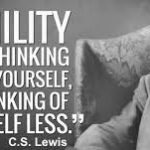About Your Money…
I’m praying for your financial needs. Some of you do not need more money but rather WISDOM in spending and in saying “No” to others when that is the appropriate response. God gives us resources according to our ABILITY to manage. “And to one he gave five talents, to another two, and to another one, to each according to his own ability…” (Matt. 25:15).
So here are my top 5 tips for staying on top of your finances:
- Pay your tithes (10% of earnings) to your local church consistently. This is the best way to insure yourself against lack.
- Walk in complete integrity; don’t cheat, lie, or engage in other acts to gain a financial advantage. This opens the door for Satan to wreak havoc with your money—plus—it is an insult to God as it implies that He can’t provide, so you are taking matters into your own hands.
- Carefully consider your transactions; don’t be impulsive. STOP. THINK. PRAY. Be clear on WHY you are spending. If everybody in the world were blind, would you still buy that item? Or, are you buying to impress?
- IMPORTANT: If you lack technical know-how regarding an endeavor or transaction, ask somebody who has succeeded in doing it. Consider HIRING an expert for an hour (or less) of consultation: “Buy the truth, and sell it not; also wisdom, and instruction, and understanding.” (Proverbs 23:23(KJV)). This is huge. Most people won’t invest in their dream; they want busy experts to sit down with them, tell them exactly what to do, and generally mentor them–all for a free lunch. This may happen in rare situations but usually NOT. TIP: If you do get a free opportunity to converse with such a person, get straight to the point with your specific questions. Take copious notes and don’t waste their time. And yes, pay for lunch!
- Expect favor with God and man. God gives favor to us for being in right standing with Him thru the Blood of Jesus. “Surely, Lord, you bless the righteous; you surround them with your favor as with a shield” Psalm 5:12 (NIV). Just ask for what you want; No isn’t fatal! Besides, if God says No, rejoice that He knows what’s best for you.
Hey, you can do this! You have a Helper…
Your Next 100 Days?
ENOUGH ABOUT PRESIDENT TRUMP AND HIS FIRST 100 DAYS!
What are YOU planning to do in the NEXT 100 days to improve the lives of others–or yourself? Here’s my plan:
(1) Together with my husband, we are going to make a bold financial move by finalizing the sale of our dream home and relocating to a community 60 miles from the big city of Los Angeles. We will purchase the new home with NO DEBT! That’s right; DEBT FREE! This is one of the hardest decisions I’ve ever made to leave my awesome view and proximity to all that LA has to offer. The will of God is more important than the opinions of man.
(2) I will slow my pace, prayerfully accepting only engagements God approves.
(3) I will finish writing the book to empower women financially: THE ONE MINUTE MONEY MENTOR FOR WOMEN.{July 2017 update: Not finished yet!!! Pray for me!!}
(4) I will increase my prayer time and time in the Word. God has so much to say to me; I need more listening time!
What about YOUR NEXT 100 DAYS? Believe it or not, God has already planned them for you! The Word says so: “…all the days ordained for me were written in your book before one of them came to be” Psalm 139:16 (NIV). God knows the plans He has for you… Just Ask HIM!
5 Ways To Release Tension
We cannot avoid stress-producing or anxiety-provoking circumstances—they are a natural consequence of life on Planet Earth. But there are effective ways to lessen their impact on our minds and bodies. In addition to walking, running, and other activities, we can begin to practice ways to release the tension that builds up in us when we experience such situations. Here are a few strategies that I use and find them to be pretty effective.
- Take a deep breath. I don’t know about you, but sometimes when I’m working at warp speed or something is going on that threatens to stress me, I find that my breathing becomes shallow. Other times it seems that I literally forget to breathe. Taking a deep breath can do wonders in diffusing the tension that you may be feeling. Deep breathing relaxes you because it lowers your heart rate and circulates extra oxygen to various parts of the body. Here’s the scoop on how to get the most out of it. I’m not sure where I first learned this, but I have practiced it for years. Pretend that your stomach is a balloon. Inhale rather loudly and slowly through your nostrils (mouth closed) counting to ten. Fill your diaphragm area as if it were a balloon. Listen only to your breathing; it should sound like the ocean. Exhale slowly through your mouth, making a hissing sound with your teeth together. Listen only to your breathing. Take the entire ten seconds to exhale. Repeat five to ten times throughout the day depending on the amount of stress that you are feeling. Obviously, this exercise has to be done in private; however, if you feel that you need to do it immediately, just skip the sound effects and breathe quietly but deeply. This is also a good exercise to do when you get into bed at night. When done with the sound effects, it can be very effective in shutting down your over-active mind.
- Squeeze an anti-stress ball or gadget. These come in several shapes. I have one that is shaped like a cellular phone, another like a mini-calculator and one like a tennis ball. Simply squeezing it as tightly as you’d like relieves tension. These are usually available at an office supply store.
- Whistle. I attended a celebration recently and as part of the festivities, all the guests received a paper funnel horn to blow at certain intervals during the program. I left the horn in my car and forgot about it. Shortly thereafter, I was driving down the street and became so exasperated with insensitive, bad drivers that I just pulled the paper horn from the side pocket of the door and blew it with all my might. What a relief! Of course, the windows were up and no one heard it except me. Any whistle will do the trick, so you might want to pick up one.
- Sing. When Paul and Silas were jailed for preaching the gospel, they chose to sing. “Around midnight, Paul and Silas were praying and singing hymns to God, and the other prisoners were listening” (Acts 16:25). I have found that a nice worship song that ushers me into the presence of God and floods my soul with peace.
- Self-Massage. Learn to massage your tense areas yourself. If you find it a little difficult to reach your shoulders and neck effectively, put a small baseball in a long sock and lean against it on a wall. You can control the intensity of the pressure by how hard you press against the wall. This also feels great on the lower back.
These are just a few of the strategies that you can employ in lieu of drumming your fingers, complaining, and engaging other annoying and unproductive habits.
What are some other ways you’ve found to be effective in releasing tension throughout your day? I would love to hear about them in the comments section below.
Deborah
Is Self-Caused Stress Sabotaging Your Peace?
 Are you your own worst enemy—your biggest stressor? Do you engage in behavior that will often lead to a stress-producing incident? Listed below are several behaviors or situations that you would do well to consider eliminating from your daily routine:
Are you your own worst enemy—your biggest stressor? Do you engage in behavior that will often lead to a stress-producing incident? Listed below are several behaviors or situations that you would do well to consider eliminating from your daily routine:
- Some women carry really large purses which contain everything that they will need from sunrise to sunset. Trying to locate an item in it—particularly in a rush—can be quite stressful. To break the “everything but the kitchen sink” habit, note how often you actually use each item in your purse each day. If the answer is never, then it may be a good candidate for leaving at home. Try carrying only the basics such as your wallet, lipstick, and keys.
- Do you shop with your purse open as if to say to a would-be purse snatcher, “Welcome; come on in”? Further, an open purse allows items to fall out of it. I live in a hilly area and am spilling the contents of my purse when I go down the hills. This is frustrating but who can I blame for self-sabotage?
- Do you realistically plan for traffic or things not going as scheduled? Are your assumptions too optimistic as to how long it will take to complete a task or drive to an appointment? The truth of the matter is that I could indeed do things within the bounds of my optimistic time frame if I were the only person on the planet. But things happen. Rather than bemoaning certain realities, you simply need to anticipate them.
And yes, I’ve been guilty of each infraction above. But what I’ve learned is that it pays to reduce most of my daily activities to a routine. Good planning and forethought are critical to minimizing self-caused stress. They will not reduce you to a life of boredom but rather will give you more time to plan something exciting and fulfilling.
Happy “Love” Day Friends!
Happy “Love” Day, Friends!
As my husband Darnell and I approach this Valentine’s Day, I’ve chosen not to focus on flowers, a card, and dinner; rather, I’m more excited when I consider that it has been the faithful love of our Heavenly Father that has kept up together—smiling—for almost 38 years. Our care, concern, and commitment are stronger than ever. And, yes, we will indeed celebrate in some small way later today.
But, dear friends, don’t let this be a day of just celebrating romantic love—or bemoaning the fact that a special romantic relationship has evaded you. In fact, whether you are married, single, a celebrator of Valentine’s Day or not at all, this is a good time to reflect on the fact that you are loved today and every day by the Creator of the Universe and that He cares about every area of your life.
The steadfast love of the Lord never ceases;
his mercies never come to an end;
they are new every morning;
great is your faithfulness.
Lamentations 3:22-23 (ESV)
So why not just decide to just let God’s love flow thru you today to somebody. Wish a senior citizen, a parent, an unloving co-worker, a single mom, or a stranger a “Happy Love Day”. If you get an odd look or response, just explain that you are happy about the steadfast love of God.
New Year, Better Communication
Do you regularly respond to a person or a group’s actions or decisions in a way that is opposite of what you really feel—as evidenced by your tone or body language (smirking, raising eyebrows, cocking your head to the side, or sighing)? Sarcasm can ruin your relationships as its goal is usually to scorn, belittle, insult, or express irritation or disapproval.
Perhaps you have convinced yourself that you are not sarcastic at all, but rather witty or humorous. Sarcasm is no joke despite your best attempt to disguise it with a laugh. Perhaps you are not aware that your sarcasm is likely to leave the hearer feeling diminished or devalued. If you want to begin to address this poor communication style, try these strategies:
- Admit your motive for being sarcastic. You may be attempting to control other people or to shame them out of behavior that you disapprove. Face it, the only person you can control is yourself. Or, maybe you are trying to display your great intellect by calling attention to the deficiency of another.
- Practice a more direct approach to expressing your displeasure. Posing a simple question designed to gain a better understanding will go a long way. For example, rather than asking “What in the world were you thinking?” try, “What strategy or goal did you have in mind when you made that move?” This latter statement expresses confidence that surely some forethought was applied. God will give you the right words to say if you ask him to do so. “…those who are wise will find a time and a way to do what is right, for there is a time and a way for everything…) (Ecclesiastes 8:5-6 NLT).
- Consider the implications and consequences of what you are about to say before you say it. Ask yourself, “Will my words imply that the hearer is stupid or has poor judgment? Do they tear down or do they build? “Do not let any unwholesome talk come out of your mouths, but only what is helpful for building others up according to their needs, that it may benefit those who listen” (Ephesians 4:29 NIV). Make sure every word passes the “benefit” test.
- Consider how you would feel if someone were to say to you, what you are about to say to another. Let the Golden Rule be your guide.
(Adapted from “Choose Your Attitude, Change Your Life” by Deborah Smith Pegues)
The Good, Bad, and Ugly About Credit Cards
Credit cards can be a gift when used wisely or an expensive curse if used improperly. Here’s how to best utilize your card and build your credit history.
The Good:
- Credit cards make travel more convenient. While you can use a debit card for car rentals and hotels, these companies will put a hold on your bank account for the total amount of the charge. If you don’t have a credit card, these funds will be temporarily taken directly from your account. Therefore, having at least $1,000 available in credit is a smart move.
- You can build credit history faster by having a credit card. Paying rent, utilities, and other living expenses on time helps, but these payments will not get reported to a credit agency unless you fail to pay them. Financial discipline is demonstrated when you show how much you could have spent versus how much you actually charged. Try to keep your balance under 50% (30% is better) of your available line of credit to improve your FICO score.
- Credit cards can bail you out in an emergency. Most financial advisors recommend an emergency reserve of 3-6 months of living expenses, but in today’s economy, the average person won’t get there. You should maintain a minimum reserve of $1,000 or at least a full paycheck in your savings in addition to an emergency line of credit.
- Credit cards that offer rewards points are the ultimate perk. You win the credit game when you charge and pay off your entire credit card balance each month. Get ready to stay in nice hotels, get free airline tickets, and a host of other benefits at no cost—you also won’t pay finance charges.
The Bad, the Ugly:
Credit cards are tempting. They allow you to indulge in your desires. Studies show that on average people will spend 30% more than planned when using credit cards. You will pay for your lack of discipline with low FICO scores and higher interest on car and home loans.
Credit cards are expensive. In fact, if you make only the minimum payment, you will pay about three times the purchase price. So, get a plan to get out of debt now. Pay more than the minimum balance when possible. If you have multiple cards, do the same, but start with the card with the lowest balance. Pay the minimum on all other cards until the card with the lowest balance is paid off. Then you can increase payments on the other cards one by one. Continue to utilize this process for each card. It’s a fool-proof plan that will fast track you out of consumer debt in no time.
You don’t have to fear credit cards; just be smart and refuse to charge things you don’t need or can’t pay for in full when the bill comes. Use rather than abuse this financial tool to improve the quality of your life.
Deborah Smith Pegues is a Certified Public Accountant, Certified Leadership Coach, and bestselling author of 16 books including 30 Days to Taming Your Finances. Read more about her at ConfrontingIssues.com
Follow @MagicJohnson on Facebook, Twitter and Instagram.
This article first appeared at:
https://theplaybook.magicjohnson.com/posts/the-good-bad-ugly-about-credit-cards
Paying the Price For Pride
I read the story of King Nebuchadnezzar often. God gave him great power and influence but he became lifted up in pride. Let’s listen in on his “self-talk” one morning:
Daniel 4:30 (NLT) As he looked out across the city, he said, ‘Look at this great city of Babylon! By my own mighty power, I have built this beautiful city as my royal residence to display my majestic splendor.’
DO YOU THINK GOD WAS GOING TO LET HIM TAKE THE GLORY FOR ALL THE FAVOR HE HAD GIVEN HIM? No way! God banished him from his kingdom for 7 years of total humiliation… became insane, nails grew out like an animal, and lost all the comforts of his kingdom. NOW, let’s see what he had to say after that:
lost all the comforts of his kingdom. NOW, let’s see what he had to say after that:
Daniel 4:37 (NLT) “Now I, Nebuchadnezzar, praise and glorify and honor the King of heaven. All his acts are just and true, and he is able to humble the proud.”
YUP. I keep this in mind ALL THE TIME. God gives favor, influence, notoriety, talent, skills, etc. for HIS GLORY–not ours! Are you taking credit for any of your gifts, talents, or achievements? If so, just repent now… don’t wait for God to “humble” you. Never forget: “Pride goes before destruction
and a haughty spirit before a fall. (Proverbs 16:18 NKJV).
5 Actions Americans Must Take Now to Heal Our Nation
 The presidential election results are in. Millions of voters are elated while millions of others are devastated. How do we move forward personally and as a country after all the negativity surrounding the campaigns? How do we heal the damaged relationships because we refuse to accept another’s right to differ? My fellow Americans, I offer five critical actions we can take immediately to start the healing of our nation:
The presidential election results are in. Millions of voters are elated while millions of others are devastated. How do we move forward personally and as a country after all the negativity surrounding the campaigns? How do we heal the damaged relationships because we refuse to accept another’s right to differ? My fellow Americans, I offer five critical actions we can take immediately to start the healing of our nation:
1) Applaud the democratic process. Rejoice that we all had the opportunity to raise our voice and vote our choice—without fear of death or negative consequences.
2) Be gracious in defeat and humble in victory. If your candidate lost, don’t pronounce doom on the country. If your candidate won, don’t gloat. Rather, recognize that the desires of the people were bigger than the candidates and their many shortcomings.
[Get the other 3 Actions at my guest blog for Bishop T.D. Jakes; this is an excerpt: https://www.tdjakes.com/posts/5-actions-americans-must-take-now-to-heal-our-nation]
6 Ways To Stop Being a Racist

Photo courtesy of tdjakes.com
At one time or another, we have all harbored a negative thought or drawn a conclusion about a person or group of another race based on our isolated personal experiences, what we have heard from others, or have seen in the media.
Refusing to be a “perpetuator” of negativity, I went on a quest to get to know, on a deeper level, individuals who “don’t look like me.” I’ve succeeded—and over the years, I’ve developed some amazing cross-cultural relationships that are mutually rewarding. Here are some of the key strategies that worked for me:
- Determine whether you are indeed a racist. Do you really believe that a particular race is inherently inferior or superior, or that their moral or social behavior is attributable specifically to race? You see, there is a good chance that rather than being a racist, you may be guilty of “racial preference” in which you prefer to be with people of your own race due to familiarity, fears about the other race, or other learned reasons. I admit that I have occasionally practiced racial preference. For example, I prefer to watch Black movies with Black people because the audience tends to respond to the humorous, joyful, or sad scenes in a way that reinforces the bond we share because of our history or other relatable cultural distinctions.
- Get close enough to understand people on an individual basis. Stop ignoring the “elephant in the room”—being racially different—and have a real conversation. Ask questions about their life experience, share a meal, and engage in a social, religious, or sports activity together. Be proactive in initiating the connection; don’t wait to be invited. If at first you don’t succeed with a particular person, try another. In the end, you will find that you have more in common than you imagined.
Get the other 3 strategies at my guest post for Bishop T.D. Jakes: https://www.tdjakes.com/posts/6-ways-to-resist-racism

